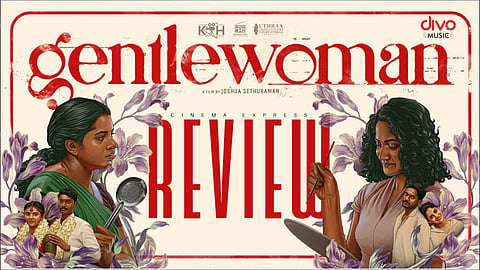Gentlewoman Movie Review: A riveting take on gender, power, and perception
Gentlewoman(3 / 5)
Why is it always ‘Ladies and gentlemen’ and not ‘Ladies and gents’ or ‘Gentlewomen and gentlemen’? This is an age-old debate, and despite living in a time where we have started to challenge patriarchy, the usage of this phrase in public gatherings never ceases to exist. Is it because men need to be reminded to be gentle? Or because women are expected to be gentle by default? Most women who are largely frustrated with manifestations of patriarchy in their daily lives often choose to ignore this condescending practice, or have we made peace with it? With his directorial debut, Gentlewoman, Joshua Sethuraman paints a picture that contradicts conventional expectations of women and their so-called gentleness. Characters defy stereotypes, appearances betray assumptions, and societal norms are questioned both directly and indirectly.
Director: Joshua Sethuraman
Cast: Lijomol Jose, Losliya Mariyanesan, Hari Krishnan
In Gentlewoman, Lijomol’s Poorni is happily married to Hari Krishnan’s Aravind until she finds a baffling truth about him. He goes missing, and Losliya’s Anna comes into the picture searching for him. The film holds an introspective lens on both overt and subtle forms of male dominance.
Perhaps the most interesting aspect of Gentlewoman is how it highlights the fact that women often underplay their potential. Initially, amidst a group of women, Poorni is the ‘man’ who changes a flickering light bulb. But she also patiently defends her husband when he hasn’t even recharged her mobile subscription for over three months. There’s a well-thought-out juxtaposition between how women downplay their abilities to be subservient to their men, while men do the same to make women serve them. This is evident when Aravind, who Poorni thinks doesn’t even know how to turn on a stove, makes coffee for his female friend. And yet, although he enjoys his wife being biddable, he puts on the progressive hat every now and then to say things like, “Ipo laam ponnunga enna enamo panranga. Iva dhaan romba yosikara.” Joshua has strewn some inexplicit ironies and some more obvious ones across the first half of the film, which is to be picked by us, the audience, as the film strikes a crescendo and eventually culminates.
With a runtime of just 113 minutes, Gentlewoman is swift to establish its conflict within the first 30 minutes. Still, the thriller is slow and simmers for a long time before it finally scorches. A remarkably proficient Lijomol carries the essence of the film’s quiet intensity, maintaining an almost unnerving composure even in the most anxiety-inducing moments. In fact, at a point we even wonder if her serenity is humane—just as a senior police officer and her own friend’s sister do in the film. If one were to go into the mind of Poorni, it would be easy to identify the anger simmering behind forcing herself to do the most unconventional deeds. Even then, the film’s choice to justify her act, although an end card says something else, makes us question what’s right and wrong. In more ways than one and both voluntarily and involuntarily, Gentlewoman pushes the audience into ethical ambiguity, much like the film’s characters.
While the first half is dedicated to setting the stage and conflict, Gentlewoman truly finds its rhythm in the second half. A police officer, written in contrast to the typical on-screen cop, adds an unexpected layer of dark humour. Through him, the film highlights how some people will always judge others based on appearances. Additionally, the film subtly suggests that often, women contribute to the downfall of other women, like the mother who knows of her son’s betraying nature. Ultimately, the film reinforces the importance of women supporting each other.
With its screenplay and story as its strongest suits, Joshua also ventures into interesting technical explorations. Much of the film, set within a house, is bathed in warm lighting, mimicking an eternal sunset. A seemingly insignificant scene of a senior officer berating his subordinate is shown entirely as a reflection on a television screen. In another moment, Losliya is framed through the intricate veins of a skeletonised leaf, going in and out of focus during a phone call. While these choices contribute to the film’s aesthetic and mood, their coherence varies. Yet, if there’s one thing Joshua gets undeniably right, it’s the casting. Losliya is excellent as Anna, making us hope she gets more roles with scope to perform. Hari Krishnan, in his limited screen time, effortlessly embodies the average man, making us despise Aravind with ease. And at the heart of it all, Lijomol transforms subtly yet unmistakably. Her Poorni challenges societal biases and powerfully underlines the point that a woman can choose herself over societal expectations.
Is Gentlewoman without flaws? No. Does it tread the fine line of justifying problematic relationships? Perhaps. But does it ignite conversation and introspection about the women in our lives, or even ourselves? Undoubtedly, yes. The film acts as a chilling reminder that women are conditioned to go over and above their comfort zone to cater to the men in their lives, but that men often do not even do the bare minimum. If Gentlewoman proves anything, it’s that being gentle is a choice, not a prerequisite. And in a world that still expects women to be gentle while excusing men, this film makes a strong case for rewriting the phrase to 'Gentlewomen and not-so-gentlemen'.

